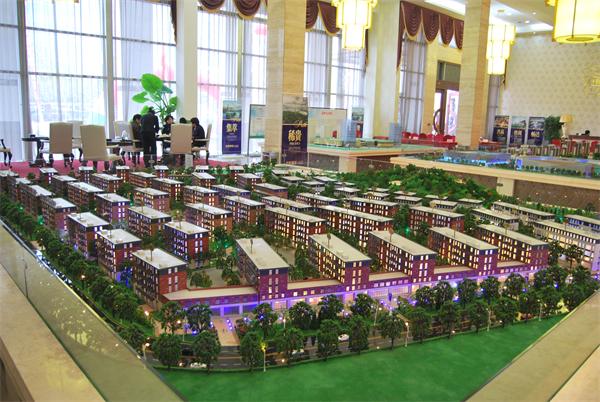A house model may choose 1 / 4 inch = 1 foot as the maximum scale, so that a 96 foot building will occupy 2 feet of desktop space or work area.
对于那些几百英尺的大型建筑,使用1/8英寸=1英尺的比例会更有效。
For large buildings with hundreds of feet, it's more effective to use a ratio of 1 / 8 inch = 1 foot.
大型场地通常使用1英寸=50英尺、100英尺或200英尺的比例,这样可以使沙盘模型易处理。
Large sites usually use a scale of 1 inch = 50 feet, 100 feet, or 200 feet, which makes the sand table model easy to handle.
概要模型开始的时候会使用很小的比例如1/32英寸、1/16英寸或1/8英寸=1英尺,会集中考虑综合性的关系;随着设计的进一步深入,可以增加沙盘模型的比例来研究细节性的问题。
At the beginning of the summary model, a small scale will be used, such as 1 / 32 inch, 1 / 16 inch or 1 / 8 inch = 1 foot, and the comprehensive relationship will be considered. With the further development of the design, the proportion of sand table model can be increased to study the details.


背景模型会使用稍小的比例,比如1英寸=10英尺或1/6英寸=1英尺。
The background model uses a smaller scale, such as 1 inch = 10 feet or 1 / 6 inch = 1 foot.
如果把展示模型建造大得可以进行细部处理,这样得展示模型通常更为直观。对于房屋来说,比例可以选择1/4英寸=1英尺或更大一些,对于大型建筑物,选择1/8英寸=1英尺的比例会更合适。
If the display model is built to be large enough for detail processing, the display model is usually more intuitive. For houses, the scale can be 1 / 4 inch = 1 foot or more, and for large buildings, 1 / 8 inch = 1 foot is more appropriate.
建筑模型的细部必须根据比例进行。这种考虑使得模拟尺寸会很难,比如在1/2英寸、1英寸=1英尺或更小的比例下模拟2或3英寸的实际尺寸。
The details of the building model must be scaled. This consideration makes it difficult to simulate the actual size, such as 2 or 3 inches at a scale of 1 / 2 inch, 1 inch = 1 foot or less.
对于像窗子竖框、屋顶饰带和连接的研究,需要使用较大而定比例,如1/2或1英寸=1英尺。
For studies such as window mullions, roof fringes, and connections, a larger scale is needed, such as 1 / 2 or 1 inch = 1 foot.
对于更小的比例,应该暗含精细的细部。
For smaller scales, fine details should be implied.












